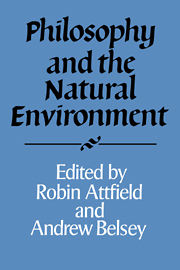37 results
5 - Anthropocentrism, Biocentrism, Stewardship and Co-Creation
- from Part I - Concepts
-
-
- Book:
- The Cambridge Companion to Christianity and the Environment
- Published online:
- 21 July 2022
- Print publication:
- 04 August 2022, pp 63-79
-
- Chapter
- Export citation
Review of David W. Rodick (ed.), Wilderness in America: Philosophical Writings of Henry G. Bugbee, New York: Fordham University Press, 2017; ISBN: 978-0-8232-7536-6
-
- Journal:
- Philosophy / Volume 94 / Issue 3 / July 2019
- Published online by Cambridge University Press:
- 13 June 2019, pp. 477-483
- Print publication:
- July 2019
-
- Article
- Export citation
Contributors
-
-
- Book:
- The Cambridge Dictionary of Philosophy
- Published online:
- 05 August 2015
- Print publication:
- 27 April 2015, pp ix-xxx
-
- Chapter
- Export citation
Popper and Xenophanes
-
- Journal:
- Philosophy / Volume 89 / Issue 1 / January 2014
- Published online by Cambridge University Press:
- 19 September 2013, pp. 113-133
- Print publication:
- January 2014
-
- Article
- Export citation
Personhood, Ethics and Animal Cognition: Situating Animals in Hare's Two-Level Utilitarianism. By Gary E. Varner. Oxford and New York: Oxford University Press, 2012, pp. xiv + 317. ISBN: 978-0199758784
-
- Journal:
- Philosophy / Volume 88 / Issue 3 / July 2013
- Published online by Cambridge University Press:
- 16 April 2013, pp. 493-498
- Print publication:
- July 2013
-
- Article
- Export citation
Beyond Anthropocentrism
-
- Journal:
- Royal Institute of Philosophy Supplements / Volume 69 / October 2011
- Published online by Cambridge University Press:
- 22 September 2011, pp. 29-46
- Print publication:
- October 2011
-
- Article
- Export citation
Darwin's Doubt, Non-deterministic Darwinism and the Cognitive Science of Religion
-
- Journal:
- Philosophy / Volume 85 / Issue 4 / October 2010
- Published online by Cambridge University Press:
- 15 September 2010, pp. 465-483
- Print publication:
- October 2010
-
- Article
- Export citation
Reviews - What Is Biodiversity By James Maclaurin and Kim Sterelny University of Chicago Press, 2008. £31/£12.50
-
- Journal:
- Philosophy / Volume 84 / Issue 4 / October 2009
- Published online by Cambridge University Press:
- 16 September 2009, pp. 605-609
- Print publication:
- October 2009
-
- Article
- Export citation
12 - Differentiated Responsibilities
-
-
- Book:
- Philosophy and Biodiversity
- Published online:
- 26 June 2009
- Print publication:
- 06 September 2004, pp 237-250
-
- Chapter
- Export citation
Index
-
- Book:
- Philosophy and the Natural Environment
- Published online:
- 19 October 2009
- Print publication:
- 30 September 1994, pp 247-250
-
- Chapter
- Export citation
Preface
-
-
- Book:
- Philosophy and the Natural Environment
- Published online:
- 19 October 2009
- Print publication:
- 30 September 1994, pp v-v
-
- Chapter
- Export citation

Philosophy and the Natural Environment
-
- Published online:
- 19 October 2009
- Print publication:
- 30 September 1994
Introduction
-
-
- Book:
- Philosophy and the Natural Environment
- Published online:
- 19 October 2009
- Print publication:
- 30 September 1994, pp 1-12
-
- Chapter
- Export citation
Frontmatter
-
- Book:
- Philosophy and the Natural Environment
- Published online:
- 19 October 2009
- Print publication:
- 30 September 1994, pp i-ii
-
- Chapter
- Export citation
Rehabilitating Nature and Making Nature Habitable
-
-
- Book:
- Philosophy and the Natural Environment
- Published online:
- 19 October 2009
- Print publication:
- 30 September 1994, pp 45-58
-
- Chapter
- Export citation
Notes on Contributors
-
- Book:
- Philosophy and the Natural Environment
- Published online:
- 19 October 2009
- Print publication:
- 30 September 1994, pp vi-vi
-
- Chapter
- Export citation
Bibliography
-
- Book:
- Philosophy and the Natural Environment
- Published online:
- 19 October 2009
- Print publication:
- 30 September 1994, pp 233-246
-
- Chapter
- Export citation
Contents
-
- Book:
- Philosophy and the Natural Environment
- Published online:
- 19 October 2009
- Print publication:
- 30 September 1994, pp iii-iv
-
- Chapter
- Export citation



